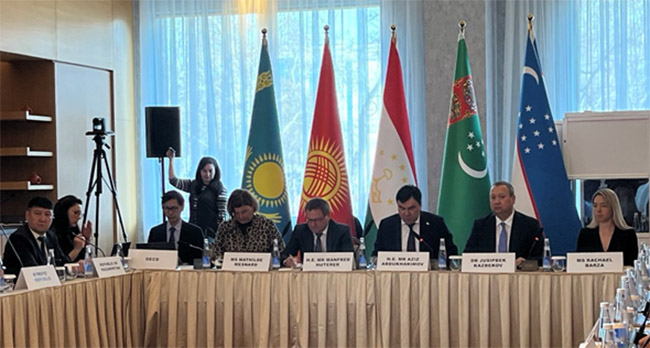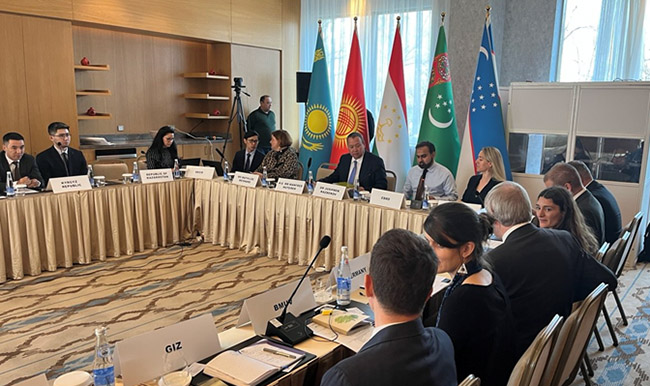No. 12 (536) March 2025
LAUNCH OF THE CENTRAL ASIAN NATURE PARTNERSHIP
On 11 March, a "High-Level Policy Dialogue: Expanding Financing and Investment to Achieve Environmental Goals in Central Asia" took place in Tashkent. The Policy Dialogue was organized by Uzbekistan's Ministry of Ecology, Environmental Protection, and Climate Change (MEEPCC), in collaboration with Germany's Federal Ministry for the Environment, Nature Conservation, Nuclear Safety, and Consumer Protection (BMUV), the European Bank for Reconstruction and Development (EBRD), and the Organization for Economic Co-operation and Development (OECD).
The event was opened by H.E. Aziz Abdukhakimov, Minister of Ecology, Environmental Protection and Climate Change of the Republic of Uzbekistan, H.E. Manfred Huterer, Ambassador of Germany to Uzbekistan, Mrs. Mathilde Mesnard, Deputy Director of the OECD Environment, and Mrs. Rachael Barza, Climate Adaptation and Nature Finance Lead at the EBRD. Representatives from Kazakhstan, Kyrgyzstan, Mongolia, Tajikistan, Turkmenistan and Uzbekistan presented their national priorities for biodiversity protection and environmental finance.

One of the key outcomes of the event was the launch of a new "Central Asian Nature Partnership" initiated by EBRD to overcome regional challenges related to environment and climate change. The Partnership will cover Kazakhstan, Kyrgyzstan, Tajikistan, Turkmenistan, and Uzbekistan, and, probably, Mongolia. It will be aimed at addressing water stress, biodiversity losses and climate adaptation. Germany has provided grant funding to support this initiative, building on existing programs including the IKI Nexus project.
The Partnership intends to:
- create a coordinated approach to financing environmental projects in Central Asia;
- strengthen regional co-operation on sustainable water use, biodiversity conservation and climate change adaptation;
- mobilize public and private investments in nature-based solutions (NbS) and environmental infrastructure.
Five possible focus areas include: sustainable water supply, improved water efficiency, pollution reduction, nature-based flood management, nature-positive business strategies and nature-based solutions.

The session on biodiversity conservation and nature-based solutions (NbS) was addressed by James Dalton, IUCN - on NbS opportunities for biodiversity conservation, Takayoshi Kato, OECD, with presentation of the report on main factors of biodiversity loss, Tulkin Rajabov, UNDP - on planning for biodiversity financing in Uzbekistan (BIOFIN), and Sergey Makarov, GIZ - on climate risk management in the region.
The next session was focused on financing mechanisms for the water, energy, food and ecosystems Nexus (WEFE Nexus). Mrs. Barza and Mr. Konstantin Kostikov, EBRD, presented the EBRD's approach to environmental financing and examples of such financing and investments in agribusiness. Takayoshi Kato, OECD, spoke about examples of nature-related financing in Central Asia and possible areas for additional mobilization under the IKI project. Dinara Ziganshina, SIC ICWC, emphasized the importance of investing in local human resources and research in the region, as well as of working in close linkage between science, decision-making processes and financing institutions. Anna Piwowarska, UNECE, spoke about the results of modeling the integration of renewable energy sources into the energy systems of the region’s countries. Greater energy interconnectivity in the region will not only reduce overall greenhouse gas emissions, but also save US$ 1.4 billion annually in power production.
Jurgen Keinhorst (BMUV), Waqas Batley (EBRD), Mathilde Mesnard (OECD) and Zhusipbek Kazbekov (MEEPCC) summarized the results of the meeting and outlined future areas of cooperation.
At the end of the meeting, the Ministry of Ecology, Environmental Protection and Climate Change of the Republic of Uzbekistan awarded Mr. Jurgen Keinhorst (BMUV) a badge ‘For Nature Conservation’.